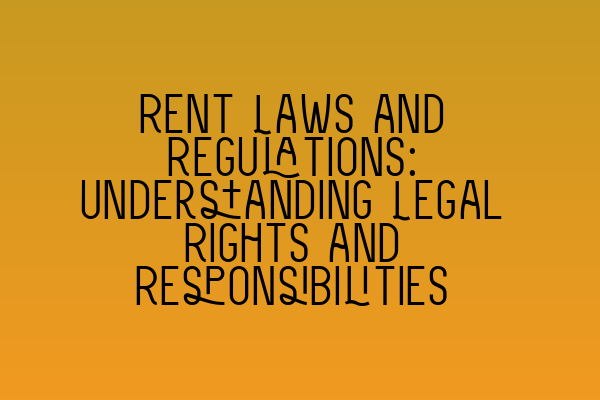As a tenant or a landlord, it is vital to understand the rent laws and regulations that govern your rights and responsibilities. From lease agreements to eviction processes, having a clear understanding of the legal framework is essential for a smooth and harmonious tenancy. In this blog post, we will delve into the key aspects of rent laws and regulations to help you navigate the complex world of property law.
Rent Control
Rent control is a crucial aspect of rent laws and regulations, particularly in areas with high demand and limited housing availability. Rent control laws aim to protect tenants from exorbitant rent increases by limiting the amount that landlords can raise the rent each year. These laws vary from jurisdiction to jurisdiction, so it is important to familiarize yourself with the specific rent control regulations in your area.
If you are a tenant, understanding rent control laws can help you negotiate fair rental rates and prevent unjustified increases. On the other hand, landlords must adhere to the prescribed rent control guidelines to avoid potential legal repercussions. Familiarizing yourself with the rent control laws in your area will ensure that both parties are aware of their rights and responsibilities.
Lease Agreements
A lease agreement is a legally binding contract that outlines the terms and conditions of the tenancy. It is crucial for both landlords and tenants to have a comprehensive lease agreement in place to protect their interests. The lease agreement should clearly state the rent amount, payment schedule, duration of the lease, responsibilities for repairs and maintenance, and any additional terms agreed upon by both parties.
When drafting or signing a lease agreement, it is advisable to seek legal assistance to ensure that the document is in compliance with all applicable laws. This will help avoid any disputes or misunderstandings down the line. Lease agreements should also include provisions for early termination, subletting, and security deposit regulations, among other important clauses.
To learn more about lease agreements, you can check out this related article: SQE 1 Practice Mocks FLK1 FLK2
Security Deposits
Security deposits are an additional aspect of rent laws and regulations that both tenants and landlords must be familiar with. These deposits serve as a form of financial protection for landlords in case of damage or unpaid rent, and they must be handled in accordance with the law.
As a tenant, it is important to document the condition of the property thoroughly before moving in and keep a record of any damages present. This will help protect your security deposit when it is time to move out. Landlords, on the other hand, must follow strict guidelines when dealing with security deposits, including providing a detailed receipt, holding it in a separate account, and returning it within the specified period after the end of the tenancy.
Eviction Processes
Evictions are often a contentious issue, and understanding the legal requirements and processes is crucial for both landlords and tenants. Different jurisdictions have their own set of rules and regulations governing eviction processes, so it is important to consult a legal professional to ensure compliance with local laws.
As a tenant, your rights must be respected throughout the eviction process. Landlords must follow legal procedures, provide proper notice, and obtain a court order if necessary. Tenants, on the other hand, must adhere to their obligations under the lease agreement and respond timely if faced with an eviction notice.
For more information on eviction processes, check out this related article: SQE 2 Preparation Courses
Legal Assistance
Given the complexity of rent laws and regulations, seeking legal assistance is highly advisable. A solicitor specializing in property law can provide invaluable guidance and ensure that your rights are protected throughout your tenancy.
If you are preparing for a career in property law, it is essential to have a strong understanding of rent laws and regulations. To further enhance your knowledge and test your understanding, you can explore this related article: SQE 1 Preparation Courses
In conclusion, understanding rent laws and regulations is vital for both tenants and landlords. From rent control and lease agreements to security deposits and eviction processes, being aware of your rights and responsibilities is essential for a smooth and fair tenancy. If you require legal assistance or wish to deepen your knowledge in this area, do not hesitate to consult with a property law solicitor.
For more information on SRA SQE exam dates, click here: SRA SQE Exam Dates
